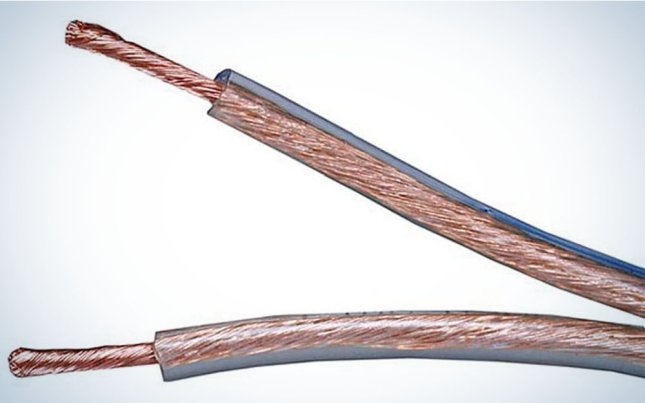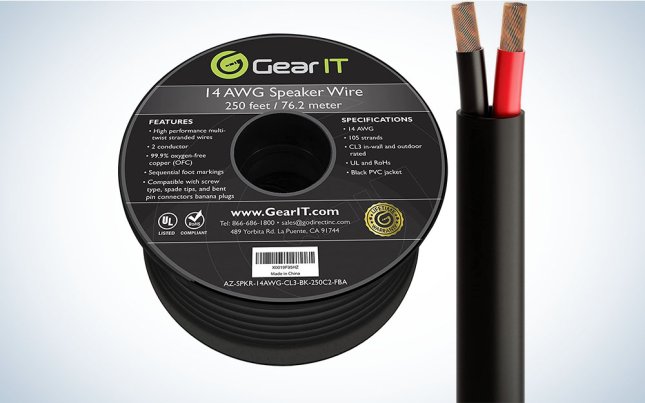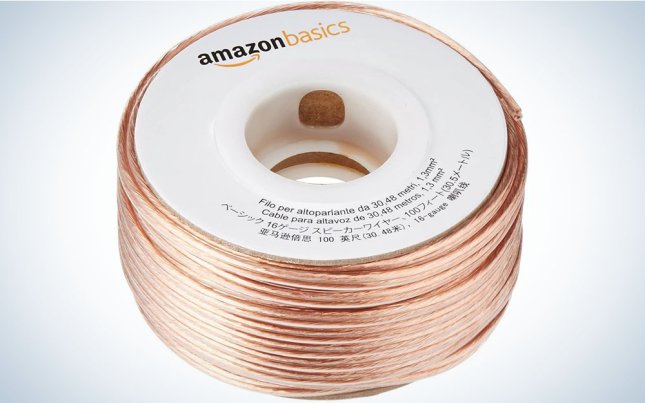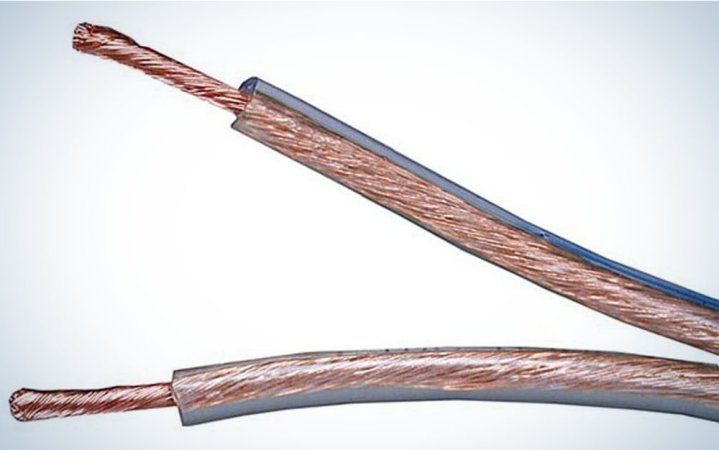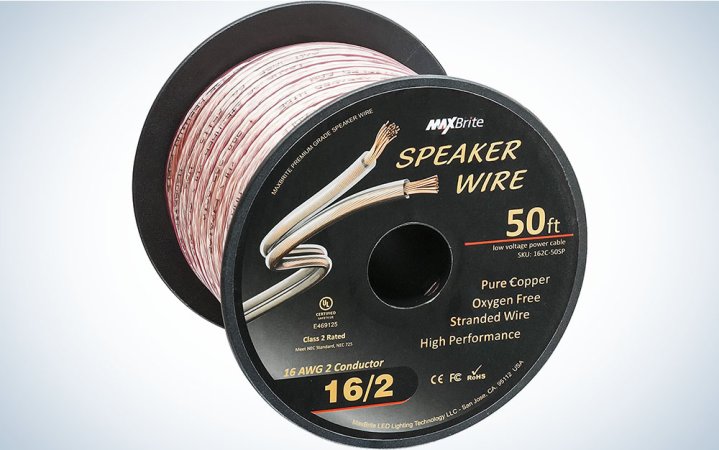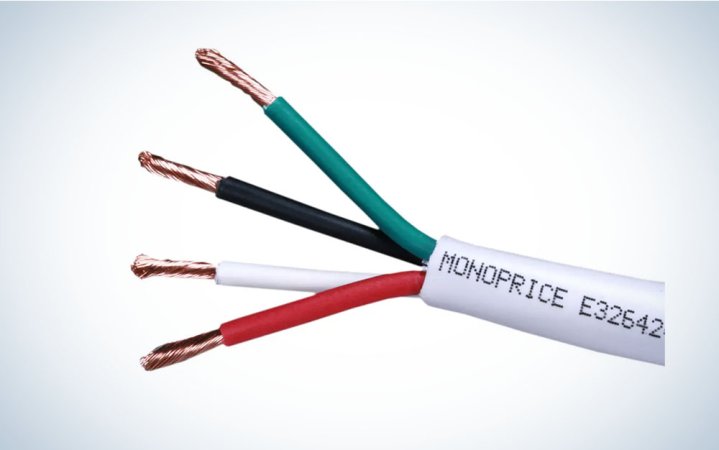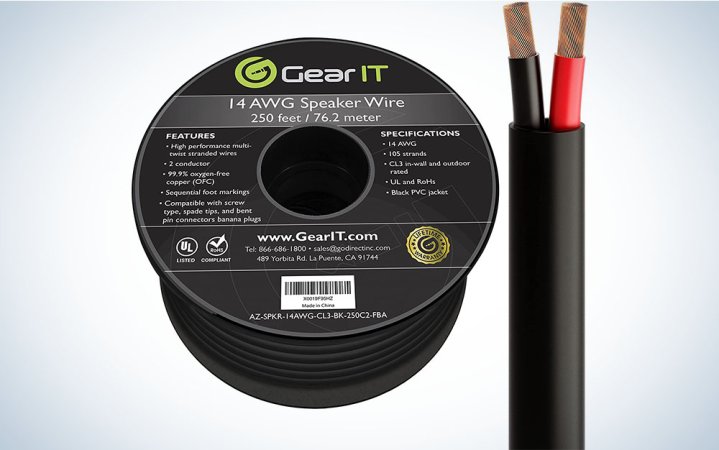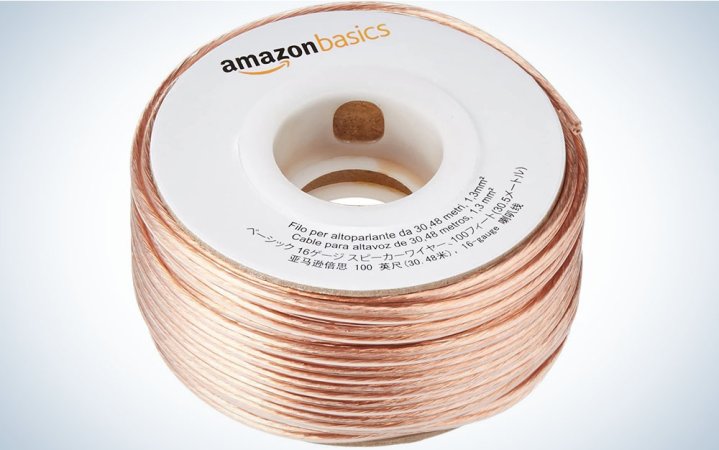We may earn revenue from the products available on this page and participate in affiliate programs. Learn more ›
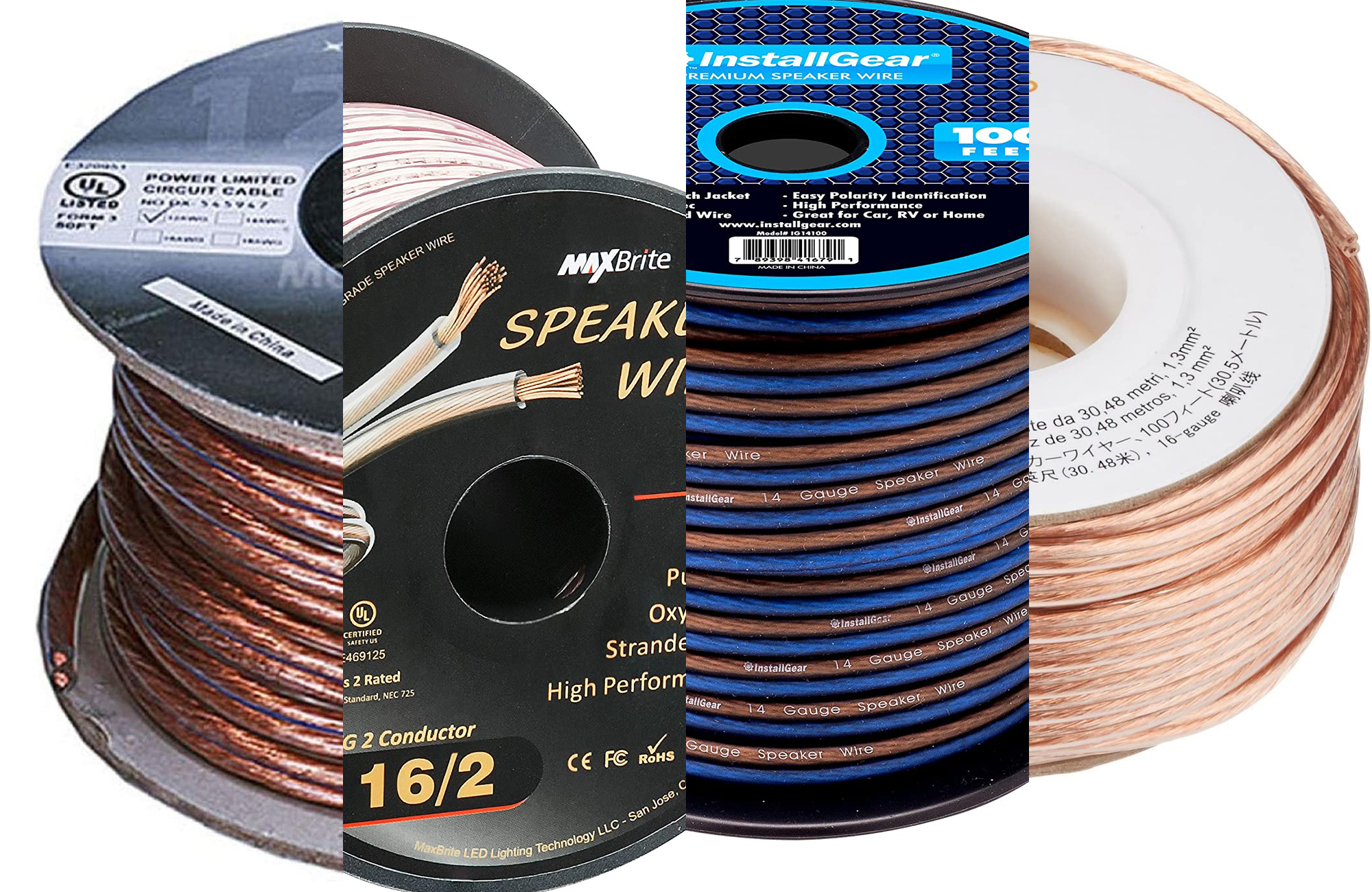
Speaker wire doesn’t have to cost a fortune to deliver a $1 million sound. Even the most affordable interconnects can have your speakers pumping in no time. However, many speakers don’t come with wire, making shopping a necessity. So, whether you’re just getting ready to build your system or looking to expand your existing equipment, we’ll explain some of the jargon and guide you toward selecting the best speaker wires for crystal-clear audio.
- Best overall: Monoprice 102747 12AWG Speaker Wire
- Best for car audio: InstallGear 14 AWG Speaker Wire
- Best for home theater: MaxBrite 16 AWG Speaker Wire
- Best bi-wire: Monoprice Access Series 4-Conductor
- Best for outdoors: GearIT 14 AWG Outdoor Speaker Wire
- Best budget: AmazonBasics 16AWG Speaker Wire
How we chose the best speaker wires
To select the best speaker wires, we looked at wire material, gauge, and manufacturer to ensure reliability across the board. We looked at over 25 recommended brands, consulted research articles, and investigated first-hand user reviews, diving deep into the debate regarding the relationship between wire quality and price. We also looked at our personal stereo speakers and home theater systems, recommending wires we used to provide a personal touch. While it’s ultimately up to you to determine whether you hear a significant difference in audio quality using particular wires, each of our picks will provide a strong, sturdy connection for excellent sound.
The best speaker wires: Reviews & Recommendations
There is much debate about whether expensive speaker wires perform significantly better than lower-priced models. The general consensus is no; listening tests and extensive research led by audio professionals agree that the quality of your speaker wire will likely be the same across the board. We recommend reaching for a speaker cable that is solidly in the middle of the pricing spectrum; the cheapest cable might not be built to last, while the most expensive cable may not improve the quality of your audio. Our recommendations let you save money for more critical pieces of gear that have a greater impact on your sound, such as amps/receivers, interfaces, and more.
Best overall: Monoprice 102747 12AWG Speaker Wire
A Clear Choice
Pros
- Reputable brand
- Available in multiple lengths/gauges
- Polarity indicator
Cons
- Wire may need to be trimmed for at-home systems
- Slightly more expensive than other mid-range models
Why it made the cut: The Monoprice 12-AWG cable is a safe, affordable option for at-home and professional systems. The thick gauge is sturdy, and the clear PVC jacket means you can easily identify polarity.
Specs
- Length: 50 / 100 / 300 feet
- Gauge: 12 / 14 / 16 AWG available
- Wire Material: Oxygen-free copper
This 12-gauge speaker wire is made from 99.95% pure oxygen-free bare copper that creates a low resistance pathway allowing signals to pass through easily. The jacket is made from transparent PVC, which lets you watch the copper wire to look out for any signs of damage and distinguish polarity.
Best for car audio: InstallGear 14 AWG Speaker Wire
A Driving Sound
Pros
- Price
- Flexible
- Colored jacket makes it easy to identify polarity
Cons
- CCA may be less conductive than other materials
- No short length options
Why it made the cut: InstallGear 14-gauge wire is thick enough to reduce resistance. It includes features to make installation easy, including a soft, colored jacket and the option for included connectors.
Specs
- Length: 100 / 500 feet
- Gauge: 14 AWG
- Wire Material: Copper-clad aluminum
This InstallGear speaker wire is particularly popular for car speaker systems but can also be used for home systems. The dual-colored jacket makes it easy to identify polarity, and it’s made from soft PVC, so it’s easy to maneuver under carpets, behind side panels, and through small openings (plus you can strip it quickly). You can also purchase InstallGear wires with banana plugs to simplify things even further. If blue and black aren’t for you, InstallGear also offers wires with different jackets so that you can choose your preferred color combination, including clear, solid white, and solid black options.
Best for home theater: MaxBrite 16 AWG Speaker Wire
A Brite Idea
Pros
- UL Safety Certified
- 200-ft length option
- Markings every 2 feet
Cons
- Not available in lengths greater than 200 feet
Why it made the cut: The MaxBrite speaker wire comes with features we love, including markings every 2 feet of wire for straightforward measurements and a polarity indicator.
Specs
- Length: 50 / 100 / 200 feet
- Gauge: 16 AWG
- Wire Material: Oxygen-free copper
This thin, 16-gauge wire is an excellent option for low-impedance speakers and shorter cable runs, like from a receiver to the front stereo and satellite speakers around the TV in a cozy, comfy living room. The OFC conductors are compatible with most available connectors and a visible red stripe helps to indicate polarity. There is a sequential marker every 2 feet, so you can more easily measure out the necessary length. Additionally, this wire is UL safety certified for home and commercial use.
Best bi-wire: Monoprice Access Series 4-Conductor
Bi-amping? Here's Wire 4 You
Pros
- Multiple gauge options
- Highly rated
- Four conductors
Cons
- Expensive
- Shorter cable lengths are unavailable
Why it made the cut: This Monoprice cable is a reliable four-conductor speaker wire for additional connectivity made from quality oxygen-free copper.
Specs
- Length: 100 / 250 feet
- Gauge: 12 / 14 / 16 / 18 AWG
- Wire Material: Oxygen-free copper
Where the other products listed here have two conductors for a one-to-one connection, this wire contains twice as many. Additional conductors can be used for bi-amping, a feature in some speakers that separately power drivers dedicated to specific frequencies. The Monoprice bi-wire organizes four colored conductors encased in a white, CL2-rated PVC jacket, allowing you to link the dedicated high- and low-frequency amplifiers with your speaker while only stringing one length.
Best for outdoors: GearIT 14 AWG Outdoor Speaker Wire
Cover Every Yard In Music
Pros
- Multiple gauge options
- CL3 Rating
- Durable
Cons
- A little pricey
- Sheathing can be challenging to cut
Why it made the cut: This GearIT wire is our top selection for outdoor use because it has a UL CL3 rating and is approved for direct burial.
Specs
- Length: 50 / 100 / 250 / 500 feet
- Gauge: 10 / 12 / 14 / 16 AWG
- Wire Material: Oxygen-free copper
If you want to run your speaker wires underground, you’ll need a wire designed for direct burial to keep you and your connection safe. This wire from GearIT does just that, with an extra black, UV-resistant PVC jacket to keep things secure. This outer jacket also has sequential markings every foot for more accurate measurement approximations. Each wire has a color-coded jack inside the outer layer for polarity identification. This wire is also approved for in-wall installation and pairs easily with most connectors.
Best budget: AmazonBasics 16AWG Speaker Wire
A Good Deal (Of Wire)
Pros
- Inexpensive
- Highly rated
- Flexible
Cons
- Polarity can be harder to identify
Why it made the cut: The AmazonBasics speaker wire is an excellent budget-friendly option with glowing reviews that espouse its functionality. While it may not be top-of-the-line or feature pure copper, it will get the job done for at-home systems.
Specs
- Length: 100 feet
- Gauge: 16 AWG
- Wire Material: Copper-Clad Aluminum
If you are putting together a home system and don’t care to weigh in on the CCA versus OFC material debate, then going with this affordable option won’t lead you astray. This 16-gauge wire is wrapped in a clear plastic jacket, with a white line down one side to indicate polarity. While this pick isn’t as visible as color-coded jackets, you’ll still be able to tell how to establish each channel’s symmetry between amp and speaker. It’s compatible with almost any connector and is neatly wrapped around a plastic dispenser.
Things to consider before buying speaker wire
There are a seemingly infinite number of speaker wires to choose from, but the reality is that when connecting most speakers, most wires are fairly similar. To select the right speaker wire for you, it’s essential to consider and understand the language manufacturers will use to describe them. We’ll walk you through terms like impedance, gauge, and resistance to help you select from our recommendations.
Function and material
Speaker wire connects speakers to AV receivers and discrete amplifiers and links individual speakers together to deliver the electrical current signal for an accurate, energetic sound. While we refer to a speaker wire as a singular thing, there are actually two independently sheathed conductors (minimum) that connect every speaker. These separate positive and negative strands are typically marked in some way to indicate audio signal polarity so they can properly match the same terminals—designated by + and – or typically colored red and black—on both your amp and speaker. This assures they transmit/receive the correct voltage.
Standard speaker wires are generally made from copper, copper-clad aluminum (CCA), and oxygen-free copper. The differences are relatively minute; CCA is cheaper with slightly higher resistance, while oxygen-free options come in several grades that suggest higher conductivity or durability. Silver and gold wires are also available, though the difference in efficacy is, once again, minimal. While there can be subtle differences in sound—silver (or silver-plated copper) wire may convey a tighter treble and gold a rounder, warmer lower range—the nuances aren’t worth the increased cost except in the most high-end, specifically tuned systems. Speaker wire is often insulated by plastic like Teflon or PVC. However, some wires are sheathed in rubber (clear casings let you see the red/black polarity, typically indicated on the connectors of a preconstructed wire).
Resistance
A speaker wire’s resistance is the most important specification when shopping. Low resistance allows the wire to energize more of the amplifier’s power to activate the speaker’s voice coil, which is wiring underneath the driver that produces a magnetic field when introduced to electricity, moving the speaker’s cone when introduced to a waveform. (If you’re interested in exactly what makes up a speaker, check out our primer.) In simplest terms, more signal equals cleaner, clearer sound.
A few factors can affect a wire’s resistance, including length, thickness, and impedance. Impedance is often listed in speaker product descriptions, measured in ohms (typically 4, 6, or 8). While you don’t necessarily need to understand the science behind impedance other than to know you should make sure the ohms of your amp/receiver and speakers correspond, know that the lower the impedance, the more critical it is to seek out a low resistance in your wire.
Gauge
A major difference between speaker wires is gauge, or diameter, also called thickness; the lower the gauge number, the thicker the wire. Measurements are based on the American Wire Gauge (AWG) standard, and you can find 12-, 14-, 16-, and 18-gauge speaker wire, 12 being the thickest. Generally, thicker wires reduce resistance but are only necessary for certain situations. If you have 8-ohm speakers and under 50 feet of cable run to the amplifier, you don’t need a wire thicker than 16 gauge. If you need to cover a great distance or have low-impedance speakers, a thicker 12- or 14-gauge wire will lower resistance and make for a more stable, consistent conduit. If you’re unsure what gauge you need, it is safer to use a thicker option to avoid sound degradation.
Connectors and wire type
Speaker wires can come with or without connectors; it’s up to you to decide whether to purchase a package or get a raw wire spool and separately select your own termination. (And if you’re doing that, don’t forget to get a wire stripper/cutter.) A banana plug is best if your speaker has a binding post (circular sockets), but you’ll need a pin connector for a spring clip terminal (square clips that slide up and clamp down on the wire). You can use bare wires for either connection, but they can be a bit of a pain to control.
You don’t need to worry about wire type if you are running speaker wire between bookshelf speakers or studio monitors, for instance. To run wire inside your walls—if, say, you’re building a home studio from the ground up—look for a unit rated CL2 or CL3. If you are running wire outside and/or underground, look for a wire rated for “direct burial.”
FAQs
Quality speaker wire can cost between $15 – $75 for spools that typically come in 50- or 100-foot lengths.
High-end speaker cables are not necessarily worth the investment, especially when other areas of your sound system could benefit from an upgrade. As long as you select a low-resistance speaker wire that can support your system, it’s unlikely that you’ll notice a difference in your music when supported by an expensive cable. However, this is a hotly debated topic, and a handful of audiophiles feel differently. Ultimately, all that matters is how your material sounds to your ears; if you try out a few cables and notice a difference, go with what sounds best.
You need as much speaker wire as you have distance between speakers and the amplifiers. For maximum accuracy, place a string or rope along the wire’s intended path, then measure its length. We recommend adding a couple of inches on either end, just in case you need a bit of slack. Speaker wires can be easily trimmed with a wire cutter, but you can’t add wire to a unit that’s too short. Remember, if your cable run is longer than 50 feet, you’ll want to pick up a thicker 12 or 14 AWG wire.
You need a copper, silver, or copper-clad aluminum wire to conduct and carry electricity. If you want to run your wire inside a wall or underground, you’ll need one specifically rated CL2 or CL3. If you want super easy installation, purchase a wire that comes with the appropriate connectors preinstalled, though using bare wire is not dangerous and will also work well.
Final thoughts on picking the best speaker wires
- Best overall: Monoprice 102747 12AWG Speaker Wire
- Best for car audio: InstallGear 14 AWG Speaker Wire
- Best for home theater: MaxBrite 16 AWG Speaker Wire
- Best bi-wire: Monoprice Access Series 4-Conductor
- Best for outdoors: GearIT 14 AWG Outdoor Speaker Wire
- Best budget: AmazonBasics 16AWG Speaker Wire
The best speaker wire will efficiently connect your system, deliver the appropriate amount of electricity, and aid in accurate audio reproduction. While there are many cables out there, in most situations, it’s important to remember not to overthink this purchase and go with a mid-range option that will suit the needs of your amp and speakers. The wire should maybe be 5% to 10% of your system’s budget. Of course, if you’re an audiophile ready to test the limits of each type of wire, it might be worth it to conduct a test of your own with higher-end materials; however, many of us won’t notice the difference between premium speaker wires and more affordable options as much as we’ll notice the difference between music and no music. Just ensure you understand the proper length you need, line up your terminals and polarities correctly, and you’ll be ready to pump up the jams in no time.
